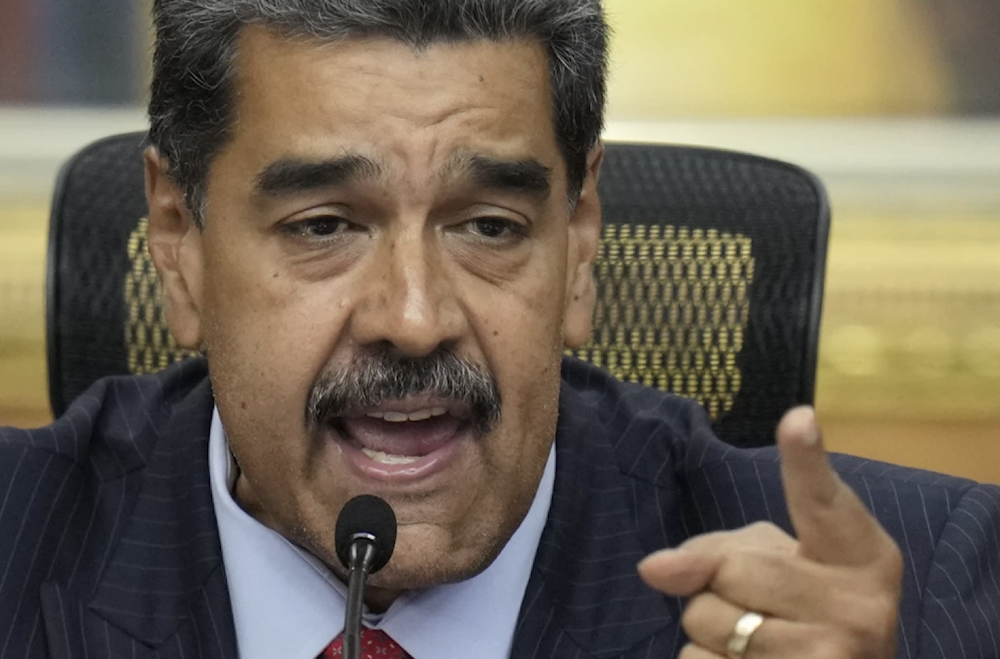Maduro urges CELAC to oppose US militarization in the Caribbean
Latin American leaders, including Venezuela’s Maduro, Cuba’s Valdés Mesa, and Brazil’s Lula da Silva, denounce US militarization in the Caribbean, call for unity, sovereignty, and an end to foreign interference.
-

Venezuelan President Nicolas Maduro holds a news conference at the Miraflores presidential palace in Caracas in Venezuela on July 31, 2024. (AP)
At the fifth CELAC-European Union Summit in Colombia, Latin American leaders strongly denounced the growing US military presence in the Caribbean, warning against foreign interventions and calling for a united regional stance in defense of sovereignty and peace.
Maduro urges CELAC to reject US military threats
Venezuelan President Nicolás Maduro issued a letter to CELAC member states urging them to categorically reject what he described the US-led militarization of the Caribbean. Referring to recent attacks on fishing vessels and the deployment of US military forces near Venezuelan maritime borders, Maduro argued that forces need to be joined as countries and "in a single voice demand an immediate cessation of the attacks and military threats against our people."
Maduro also demanded an independent investigation into the extrajudicial killings at sea, previously condemned by UN human rights. His statement emphasized the need for regional mechanisms for humanitarian cooperation and collective defense to protect territorial sovereignty.
“Our history demands we do not bow to foreign domination. Latin America must preserve its will, strength, and autonomy,” he declared.
The president of Venezuela #NicolasMaduro has sent a statement to the IV #CELAC Summit in which he expresses and recalls that history is proof that #LatinAmerica must not bow down to foreign powers and must always maintain its will, strength, and autonomy. pic.twitter.com/P4PwihMOCe
— teleSUR English (@telesurenglish) November 9, 2025
Cuba echoes warning, calls for respectful dialogue
Cuban Vice President Salvador Valdés Mesa echoed Maduro’s concerns, denouncing US warmongering in the region. Speaking at the summit, he urged respect for sovereign equality and non-interference in domestic affairs.
The vice president hoped the summit would "contribute to strengthening a more robust CELAC-European Union relationship, oriented towards inclusive development and cooperation, with greater commitment and capacity for dialogue, based on reciprocity and without interference, allowing us to achieve objectives and build spaces for mutual benefit."
Valdés emphasized priority areas such as climate action, food security, and development financing, urging Europe to engage more deeply and equitably with Latin America.
Lula da Silva slams rhetoric justifying interventions
Brazilian President Luiz Inácio Lula da Silva condemned what he described as recycled narratives aimed at justifying foreign military interventions in the region.
“We are a region of peace and wish to remain so. Democracies do not fight crime by violating international law,” Lula said in his speech in Santa Marta.
While not naming US President Donald Trump directly, Lula criticized recent military deployments in Caribbean waters and attacks on civilian vessels. He reiterated that such actions undermine regional stability and called for Latin America to remain a “zone of peace.”
Lula also addressed the challenge of organized crime, asserting that international cooperation is essential in combating transnational criminal networks. He highlighted Brazil's renewed commitment to regional security through initiatives like the Tripartite Command with Argentina and Paraguay, and a new International Police Cooperation Center in Manaus.
A regional pushback against militarization
The summit has spotlighted growing concern across Latin America about Washington's renewed militarization near Venezuela, amid accusations of regime change attempts and resource exploitation.
With regional leaders unified in calling for peace, non-intervention, and sovereignty, the CELAC-EU summit marks a pivotal moment in Latin America's collective response to foreign pressure and military encroachment.

 3 Min Read
3 Min Read










